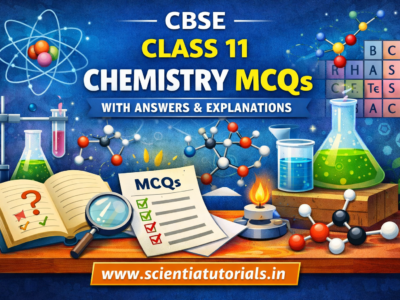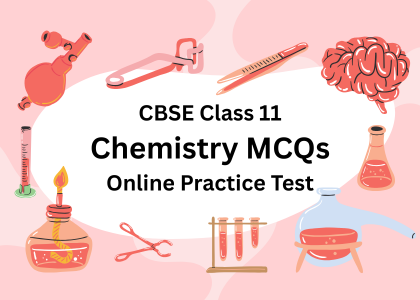CBSE Class 11 Chemistry MCQs – Online Practice Test
Prepare effectively for your board exams with our CBSE Class 11 Chemistry MCQs – Online Practice Test designed strictly as per the latest NCERT syllabus. This interactive quiz series helps students strengthen conceptual understanding, enhance problem-solving skills, and assess exam …
Overview
Prepare effectively for your board exams with our CBSE Class 11 Chemistry MCQs – Online Practice Test designed strictly as per the latest NCERT syllabus. This interactive quiz series helps students strengthen conceptual understanding, enhance problem-solving skills, and assess exam readiness through chapter-wise multiple-choice questions.
Each practice test includes NCERT-aligned questions covering Physical, Inorganic, and Organic Chemistry topics. With instant scoring and detailed feedback, learners can track their progress and identify weak areas for improvement. Whether revising Some Basic Concepts of Chemistry, Chemical Bonding, or Thermodynamics, this online test offers comprehensive coverage for all important chapters.
Ideal for CBSE Class 11 students, competitive exam aspirants, and self-learners, this resource provides an engaging and exam-oriented learning experience. Attempt these MCQs anytime online and boost your confidence before the final board exams. Start now and experience a smarter way to master Class 11 Chemistry!
Curriculum
- 14 Sections
- 126 Lessons
- Lifetime
- Part A: Physical Chemistry - Chapter 1: Some Basic Concepts of ChemistryThe CBSE Class 11 Chemistry MCQs – Online Practice Test for Part A: Physical Chemistry – Chapter 1: Some Basic Concepts of Chemistry helps students master core fundamentals through engaging and exam-oriented questions. Designed strictly as per the latest NCERT syllabus, this quiz offers automatic scoring and per-question feedback to support effective self-assessment. Each question focuses on key topics such as the Mole Concept, Laws of Chemical Combination, and Stoichiometry, making it perfect for board exam preparation. These CBSE Class 11 Chemistry MCQs follow NCERT patterns to ensure complete conceptual clarity and accuracy—ideal for students aiming to excel in both school exams and competitive tests.8
- Part A: Physical Chemistry - Chapter 2: Structure of AtomThe CBSE Class 11 Chemistry MCQs – Online Practice Test for Part A: Physical Chemistry – Chapter 2: Structure of Atom is designed to strengthen students’ conceptual understanding of atomic theory. Based strictly on the latest NCERT syllabus, this quiz includes automatic scoring and per-question feedback to make learning interactive and result-oriented. The practice set covers key topics such as Bohr’s Model, Quantum Numbers, Electronic Configuration, and Dual Nature of Matter, helping learners prepare effectively for board exams. These CBSE Class 11 Chemistry MCQs are perfect for self-assessment, revision, and mastering the foundational concepts essential for both CBSE board exams and competitive entrance tests.9
- 2.1Quantum Numbers and Orbitals
- 2.2Bohr’s Model and Dual Nature
- 2.3Electronic Configuration Exercises
- 2.4Wave Nature and Atomic Models
- 2.5Photoelectric Effect and de Broglie Concept
- 2.6Spectrum and Atomic Orbitals
- 2.7Energy Levels and Transitions
- 2.8Aufbau and Hund’s Rule
- 2.9Structure of Atom for Board Exams
- Part A: Physical Chemistry - Chapter 3: Classification of Elements and Periodicity in PropertiesThe CBSE Class 11 Chemistry MCQs – Online Practice Test for Part A: Physical Chemistry – Chapter 3: Classification of Elements and Periodicity in Properties helps students understand the systematic arrangement of elements and their periodic trends. Based on the latest NCERT syllabus, this interactive quiz offers automatic scoring and per-question feedback to enhance learning efficiency. It includes important topics such as Modern Periodic Law, Atomic Size, Ionization Enthalpy, Electron Gain Enthalpy, and Electronegativity. These CBSE Class 11 Chemistry MCQs are crafted to match board exam standards, providing excellent practice for concept clarity, revision, and self-assessment for students preparing for CBSE exams and competitive entrance tests.8
- 3.1Periodic Classification of Elements
- 3.2Modern Periodic Law and Trends
- 3.3Ionization Enthalpy and Electronegativity
- 3.4Periodic Table and Properties
- 3.5Atomic Size and Valency Trends
- 3.6Periodic Trends and Table Arrangement
- 3.7Concept MCQs – s, p, d, f Block Overview
- 3.8Chemistry MCQs – Periodicity in Properties
- Part A: Physical Chemistry - Chapter 4: Chemical Bonding and Molecular StructureThe CBSE Class 11 Chemistry MCQs – Online Practice Test for Part A: Physical Chemistry – Chapter 4: Chemical Bonding and Molecular Structure is designed to strengthen students’ understanding of how atoms combine and form molecules. Created strictly according to the latest NCERT syllabus, this test features automatic scoring and per-question feedback to help learners assess their grasp of key topics such as Lewis Structures, VSEPR Theory, Hybridization, Bond Parameters, and Molecular Orbital Theory. These CBSE Class 11 Chemistry MCQs provide exam-oriented practice and conceptual clarity, making them ideal for board exam preparation and competitive exam readiness. Practice now to master the fundamentals of chemical bonding with confidence.9
- 4.1Chemical Bonding and Molecular Geometry
- 4.2Ionic, Covalent, and Coordinate Bonds
- 4.3VSEPR Theory and Hybridization
- 4.4Bond Parameters and Resonance
- 4.5Bond Order and Polarity
- 4.6Valence Bond and Molecular Orbital Theory
- 4.7Chemical Bonding and Molecular Structure
- 4.8Lewis Structure and Shapes of Molecules
- 4.9Hydrogen Bonding and Applications
- Part A: Physical Chemistry - Chapter 5: States of Matter – Gases and LiquidsThe CBSE Class 11 Chemistry MCQs – Online Practice Test for Part A: Physical Chemistry – Chapter 5: States of Matter – Gases and Liquids helps students understand the behavior of matter in different states through concept-based questions. Developed strictly as per the latest NCERT syllabus, this test includes automatic scoring and per-question feedback for effective self-assessment. It covers key concepts such as Gas Laws, Kinetic Molecular Theory, Ideal and Real Gases, and Intermolecular Forces in Liquids. These CBSE Class 11 Chemistry MCQs are perfect for board exam preparation, ensuring conceptual clarity and application-based learning. Practice this interactive quiz to strengthen your foundation in the states of matter.9
- 5.1States of Matter
- 5.2Gas Laws and Kinetic Theory
- 5.3Ideal and Real Gases
- 5.4Boyle’s, Charles’ and Avogadro’s Laws
- 5.5Liquefaction and Deviation from Ideal Gas
- 5.6Pressure, Volume, and Temperature Relationships
- 5.7Intermolecular Forces and Liquids Behavior
- 5.8Gas Equation Derivations
- 5.9Gas Constants and Calculations
- Part A: Physical Chemistry - Chapter 6: ThermodynamicsThe CBSE Class 11 Chemistry MCQs – Online Practice Test for Part A: Physical Chemistry – Chapter 6: Thermodynamics is an excellent tool to master the fundamental laws of energy and heat transformation. Designed strictly according to the latest NCERT syllabus, this interactive quiz offers automatic scoring and per-question feedback to enhance conceptual clarity and exam readiness. It covers key topics such as the First Law of Thermodynamics, Enthalpy, Internal Energy, Heat Capacity, and Gibbs Free Energy. These CBSE Class 11 Chemistry MCQs are ideal for board exam preparation, helping students strengthen their understanding of thermodynamic processes and apply concepts effectively in both school and competitive exams.8
- Part A: Physical Chemistry - Chapter 7: EquilibriumThe CBSE Class 11 Chemistry MCQs – Online Practice Test for Part A: Physical Chemistry – Chapter 7: Equilibrium helps students build a strong understanding of chemical and ionic equilibrium concepts essential for board exams. Based strictly on the latest NCERT syllabus, this interactive quiz features automatic scoring and per-question feedback to make learning analytical and result-oriented. The test covers important topics like Law of Mass Action, Le Chatelier’s Principle, Equilibrium Constant (Kc, Kp), pH, Buffer Solutions, and Solubility Product. These CBSE Class 11 Chemistry MCQs are designed to match exam standards, making them ideal for practice, revision, and improving conceptual clarity for both CBSE and competitive exam aspirants.9
- 7.1Equilibrium Concepts
- 7.2Le Chatelier’s Principle and Equilibrium Constant
- 7.3Ionic and Chemical Equilibrium
- 7.4pH, pOH, and Hydrolysis Calculations
- 7.5Buffer Solution and Solubility Product
- 7.6Acids, Bases, and Equilibrium Applications
- 7.7Law of Mass Action and Ka, Kb Concepts
- 7.8Indicators and Common Ion Effect
- 7.9Chemical Equilibrium
- Part B: Inorganic Chemistry - Chapter 8: Redox ReactionsThe CBSE Class 11 Chemistry MCQs – Online Practice Test for Part B: Inorganic Chemistry – Chapter 8: Redox Reactions is designed to help students master one of the most important concepts in chemistry — oxidation and reduction. Aligned strictly with the latest NCERT syllabus, this quiz includes automatic scoring and per-question feedback to promote effective learning and self-assessment. It covers key topics such as oxidation numbers, balancing redox equations, oxidation-reduction reactions, and redox titrations. These CBSE Class 11 Chemistry MCQs ensure conceptual clarity and exam readiness, making them ideal for students preparing for CBSE board exams as well as competitive exams like JEE and NEET.8
- 8.1Redox Reactions and Oxidation Numbers
- 8.2Balancing Redox Equations by Ion-Electron Method
- 8.3Oxidation, Reduction, and Redox Concepts
- 8.4Oxidizing and Reducing Agents Examples
- 8.5Redox in Titrations and Reactions
- 8.6Electron Transfer and Oxidation State
- 8.7Redox Reaction Applications
- 8.8Redox and Oxidation Numbers
- Part B: Inorganic Chemistry - Chapter 9: HydrogenThe CBSE Class 11 Chemistry MCQs – Online Practice Test for Part B: Inorganic Chemistry – Chapter 9: Hydrogen helps students understand the unique properties and versatile role of hydrogen in chemistry. Crafted strictly according to the latest NCERT syllabus, this interactive quiz offers automatic scoring and per-question feedback to enhance learning outcomes. It covers essential topics such as isotopes of hydrogen, hydrides, water, hydrogen peroxide, and the hydrogen economy. These CBSE Class 11 Chemistry MCQs provide exam-oriented practice and conceptual clarity, making them perfect for board exam preparation. Strengthen your knowledge of hydrogen and its compounds with this NCERT-based, self-assessing online practice test.10
- 9.1Hydrogen and Its Compounds
- 9.2Properties and Position of Hydrogen
- 9.3Hydrides and Water Formation
- 9.4Hydrogen Peroxide and Its Uses
- 9.5Heavy Water and Isotopes of Hydrogen
- 9.6Hydrogen Economy and Fuel Cells
- 9.7Hydrogen Preparation and Reactions
- 9.8Hydrogen and Its Compounds
- 9.9Hydrogen and Water Relationship
- 9.10Hydrogen and Its Role
- Part B: Inorganic Chemistry - Chapter 10: The s-Block Elements (Alkali and Alkaline Earth Metals)The CBSE Class 11 Chemistry MCQs – Online Practice Test for Part B: Inorganic Chemistry – Chapter 10: The s-Block Elements (Alkali and Alkaline Earth Metals) helps students build a solid understanding of the chemical behavior and trends of Group 1 and Group 2 elements. Based strictly on the latest NCERT syllabus, this quiz features automatic scoring and per-question feedback to ensure effective and engaging learning. It covers important concepts such as physical and chemical properties, anomalous behavior, diagonal relationship, and uses of sodium, potassium, calcium, and magnesium. These CBSE Class 11 Chemistry MCQs are ideal for board exam preparation, concept revision, and enhancing problem-solving skills in inorganic chemistry.10
- 10.1Chemistry MCQs – s-Block Elements
- 10.2Alkali Metals and Alkaline Earth Metals
- 10.3The s-Block Elements – Physical and Chemical Properties
- 10.4Sodium, Potassium, Calcium, and Magnesium Compounds
- 10.5Anomalous Properties and Trends
- 10.6Solubility, Flame Tests, and Applications
- 10.7NCERT Quiz – s-Block Elements and Compounds
- 10.8The s-Block Elements – Biological Importance and Uses
- 10.9Chemistry Test – s-Block Reactions and Comparisons
- 10.10Alkali and Alkaline Earth Metals
- Part B: Inorganic Chemistry - Chapter 11: The p-Block Elements (Group 13 & 14)The CBSE Class 11 Chemistry MCQs – Online Practice Test for Part B: Inorganic Chemistry – Chapter 11: The p-Block Elements (Group 13 & 14) helps students understand the properties, trends, and compounds of the boron and carbon families. Developed strictly according to the latest NCERT syllabus, this interactive quiz provides automatic scoring and per-question feedback for effective concept evaluation. It covers key topics such as anomalous behavior of boron, important compounds of aluminium, allotropes of carbon, and oxidation states of group 14 elements. These CBSE Class 11 Chemistry MCQs are ideal for NCERT-based board exam preparation and concept reinforcement, helping students strengthen their foundation in inorganic chemistry.9
- 11.1Chemistry MCQs – p-Block Elements
- 11.2Boron Family and Carbon Family Overview
- 11.3Oxides and Halides of p-Block Elements
- 11.4Properties of Boron, Aluminium, and Carbon
- 11.5Anomalous Behavior of Boron
- 11.6Allotropes of Carbon and Silicon
- 11.7Group 13 and 14 Elements and Compounds
- 11.8CBSE Test – p-Block Reactions and Bonding Patterns
- 11.9Carbon and Silicon Compounds
- Part C: Organic Chemistry - Chapter 12: Organic Chemistry – Some Basic Principles and TechniquesThe CBSE Class 11 Chemistry MCQs – Online Practice Test for Part C: Organic Chemistry – Chapter 12: Organic Chemistry – Some Basic Principles and Techniques is designed to help students grasp the foundational concepts of organic chemistry. Created strictly according to the latest NCERT syllabus, this online quiz includes automatic scoring and per-question feedback for self-paced and effective learning. It covers essential topics such as IUPAC nomenclature, electronic effects, isomerism, purification methods, and reaction mechanisms. These CBSE Class 11 Chemistry MCQs are ideal for board exam preparation, conceptual clarity, and quick revision. Practice this NCERT-based test to strengthen your understanding of the principles and techniques of organic chemistry.10
- 12.1Basic Concepts of Organic Chemistry
- 12.2IUPAC Nomenclature and Classification
- 12.3Isomerism and Purification
- 12.4Organic Reaction Mechanisms
- 12.5Inductive and Resonance Effects
- 12.6Electronic Displacement in Covalent Bonds
- 12.7Reaction Intermediates and Bond Cleavage
- 12.8Purification of Organic Compounds
- 12.9CBSE Online Test – Organic Basic Principles
- 12.10Class 11 Chemistry – Organic Techniques Simplified
- Part C: Organic Chemistry - Chapter 13: HydrocarbonsThe CBSE Class 11 Chemistry MCQs – Online Practice Test for Part C: Organic Chemistry – Chapter 13: Hydrocarbons helps students strengthen their understanding of the structure, properties, and reactions of alkanes, alkenes, alkynes, and aromatic hydrocarbons. Based strictly on the latest NCERT syllabus, this interactive quiz provides automatic scoring and per-question feedback to support effective revision and self-assessment. It covers important concepts such as nomenclature, isomerism, substitution and addition reactions, and combustion of hydrocarbons. These CBSE Class 11 Chemistry MCQs are designed to meet board exam standards, making them ideal for enhancing conceptual clarity, improving problem-solving skills, and preparing for both CBSE and competitive exams.9
- 13.1CBSE Class 11 Chemistry MCQs – Hydrocarbons
- 13.2NCERT MCQs – Alkanes, Alkenes, and Alkynes
- 13.3Class 11 Chemistry Practice Test – Aromatic Hydrocarbons
- 13.4Physical and Chemical Properties of Hydrocarbons
- 13.5Nomenclature and Isomerism
- 13.6Mechanisms of Substitution and Addition
- 13.7NCERT Quiz – Combustion, Pyrolysis, and Oxidation
- 13.8CBSE Test – Reactions of Alkenes and Alkynes
- 13.9Aromatic Compounds and Benzene
- Part C: Organic Chemistry - Chapter 14: Environmental ChemistryThe CBSE Class 11 Chemistry MCQs – Online Practice Test for Part C: Organic Chemistry – Chapter 14: Environmental Chemistry helps students understand the chemical processes occurring in the environment and their impact on ecosystems. Designed strictly as per the latest NCERT syllabus, this quiz features automatic scoring and per-question feedback to make learning interactive and exam-oriented. It covers key topics such as air, water, and soil pollution, ozone depletion, acid rain, and green chemistry principles. These CBSE Class 11 Chemistry MCQs are ideal for board exam preparation, promoting environmental awareness along with conceptual clarity. Practice this NCERT-based test to revise and reinforce your understanding of environmental chemistry.10
- 14.1CBSE Class 11 Chemistry MCQs – Environmental Chemistry
- 14.2NCERT MCQs – Pollution and Green Chemistry
- 14.3Class 11 Chemistry Practice Test – Water, Soil, and Air Pollution
- 14.4CBSE Practice Test – Ozone Depletion and Acid Rain
- 14.5Environmental Impact of Chemicals
- 14.6CBSE Concept – Waste Management and Reuse
- 14.7Chemical Reactions in the Environment
- 14.8Green Chemistry Principles
- 14.9Environmental Chemistry Applications
- 14.10Pollution Control Measures




